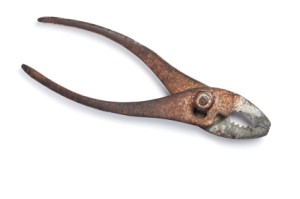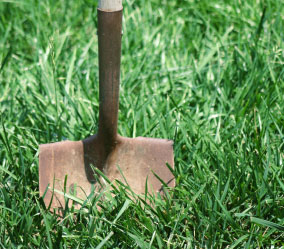
This page contains the following solutions.
I forgot some gardening tools in a bucket of topsoil last fall and discovered them just a few days ago. The hand clippers were especially encrusted with rust.
I disassembled the clippers and drowned the parts in a solution 50 percent regular bleach, 50 percent white vinegar. I left the whole mess to stew outside for a day and a half. All the rust had lifted off. I only had to rinse the parts with hose spray.
A 'natural' steel patina remained on the shears. It may come off easily or not -- but who cares, as long as the cutting edges maintain sharpness.
Warning: We all know bleach and vinegar are marvelous cleaning agents. I lucked out when combining them the way I did. Beware of fumes from the combo at first, which is why I put the pan outside.
By Chuck from Canton, OH
Remove rust from garden tools with steel wool dipped in kerosene or turpentine. Then oil the tools lightly to prevent the rust from forming again.
Source: My grandparents did this.
By Monica from Cortez, CO
To remove rust, try using table salt and 1 Tbsp. lemon juice. Apply the paste to the rusted area with a dry cloth and rub.
By Monica from Cortez, CO
Here are the questions asked by community members. Read on to see the answers provided by the ThriftyFun community.
Is there a good way to remove rust and recondition sewing machine needles?
By Judith C.
Rusted, old sewing machine needles are best tossed in the bin and replaced with new, clean, sharp ones. You'll never get ALL the rust barbs off the shank and those miniscule barbs will catch in thread and fabric.
Plus old points loose their sharpness after 5 or so years in storage. You can try plunging them in and out of a strawberry (that dangly thing attached to a pin cushion tomato) but you'll never get the true sharp needed for sewing back on those points.
Basic sewing machine needles are very inexpensive-just be sure you buy the correct size for your machine and project. Different projects (fabrics, thickness, etc) require different sizes and types for success, and you'd be using a different needle on a Brother embroidery machine than you would on a standard Singer domestic machine for sewing clothing and household items, for example.
But if you are on a desert island or incredibly tight financially, you can try soaking the needles in WD40 then after wiping off all of the WD40, holding the flat end in one hand and scraping the shank and point between the folds of a sheet of super-fine grit sandpaper.
Be advised the above rarely works for any real length of time-you might be able to get a little more done on the project but really, it's at best a stop-gap measure. Better to replace if at all possible.
I have some very old sewing machine needles in the original packets-I have those in a shadow box decoration near my sewing machine. I'd never try to sew with those antiques, though.
I would not want to even attempt this - just not worth the hassle, and I really don't think it will work for any length of time. Best to just toss them and buy new ones...
Hello!
Do not try to scratch the needles ! Especially with sandpaper !Otherwise the needles will become rough and will not be able to go softly along or into the threads of the textile.
From the softest to the most agressive, here are 3 methods :
1 . Let the needles stay a few days in oil (mineral oil)
2 . Stick the needles into an onion. After 15' wipe them with soft cotton.
3 . Put the needles in lemon juice and then put them in a box with fine salt and shake the box for a few minutes.
To finish the process you should put petroleum jelly or mineral oil again on the needles and use them on your sewing machine. Make them sew without thread through a cotton rag the textile will softly abrase the needle.
Hope this help!
Catherine
This really interests me as I just bought a ma h8ne from 1860 that has rusted needles that are curved and I cant get anymore!
Tips for keeping rust off tools. Post your ideas.

To keep your tools rust free, rub a small amount of cheap hair conditioner on the metal. No more rust.
By Mary Primorac
We have a bucket of used oil & sand mix that we shove all the tools into after using. the oil coats and the sand cleans and sharpens
Spraying with WD-40 works.
Another good and easy way to keep tools from rusting, is to put a couple pieces of chalk in your tool box. The chalk will absorb any moisture in the air, and they won't rust.
I have a number of gardening tools that need a good cleaning and de-rusting. Can any one out there give me some ideas? The more organic, the better! Thanks.
By maria r. from Blue Ridge, GA
I have heard that WD40 will remove rust . also that after your tools are clean keep them in a bucket of sand ( plunged into the sand) to keep clean Anyone else heard of this? WD40 is a natural product.
CLR works well and is enviroment friendly. Yes they say a bucket of sand with some oil in it wil keep them from rusting. For heavy rust a wire wheel on a drill will clean things up in a hurry, the drill does the hard work for you.
Bucket of sand with any oily product will help a lot. Naval Jelly will be good if heavily rusted, to start with, then the oily sand routine.
This is a page about removing rust from saw blades. Rust can develop on any exposed metal surfaces, including your tools.
ThriftyFun is one of the longest running frugal living communities on the Internet. These are archives of older discussions.

|
How do you remove rust from metal tools? Tips from the ThriftyFun community.
The only way I know to restore rusted tools is with LOTS of elbow grease - sand the metal parts, either by hand or you could try one of those abrasive attachments for an electric drill. Once the rust is removed, coat the metal with some butcher's wax (available in hardware stores, kmart, walmart, etc.) when storing the tools to prevent further rust damage.
Clean and dry tools after each use, and periodically apply butcher's wax throughout the season of use. Hang them when storing - don't let the metal parts rest on the damp ground or damp basement/garage floor. Depending on how bad the tools are, you might need to use a bench grinder to put a new edge on shears or even shovels. Wax afterward.
By one_ramp
Fill a 5 gallon bucket with sand, pour used motor oil in there. When you're done using the tool, shove it in the bucket. It cleans it, coats it with oil and sharpens it slightly, works great.
By Leann
Here's a sharp idea: remove rust from household tools by using Morton's Salt and 1 tablespoon lemon juice. Apply the paste to rusted area with a dry cloth and rub.
By MrsMoted2
Spray with WD40 then use a metal wire wool to remove the rust.
By Stuart
Spray WD-40 and wipe it off with steel wool.
By Twin Turbo
The best and least expensive way to remove rust is using a wire brush to knock off all the heavy stuff and steel wool to finish it with and after you get it all cleaned up coat it with car polish or regular old cooking oil
By Deniser
A eco friendly product which is great on rust is Blackstrap Molasses. You water it down, 1 part molasses to 9 parts water. Use this on steel products only, no alloys as they will be eaten away. It's safe to handle except it is sticky but washes off in water. Drop the rusty steel in the brew and check it in a couple of days, most surface rust will be gone.
Badly rusted objects can take as long as 3 weeks. Wash down occasionally and give parts a scrub to remove any dirt or oil then put back in the brew. When happy that object is clean, wash down and oil or use WD40/CRC to stop from rusting again. Old idea used by vintage engine restorers like myself. It keeps working for about a year but does get a bit smelly so leave outside. When finished, dump it in the garden as plants love it, no dangerous chemicals!
By Brent from New Zealand
Naval Jelly is made for removing rust and works well on tools. There are also products that are rust converters and turn the rust back into metal. It still requires some sanding but they work quite well.
Susan from ThriftyFun
Post your own advice below.
Soak in undiluted vinegar, wipe dry and put in the sun to dry completely. Then spray with oil, such as Spray and Cook, wipe and that's it! (09/27/2007)
I'm a carpentry student, and the rule is if the rust doesn't come off with a wire brush and elbow grease, the tool is not safe to use as it has become corroded.
If you can not afford to replace it, check with the freecycle group in your area.
(09/29/2007)
By octoberbabye